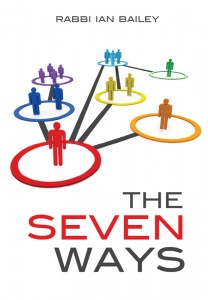Vayishlach: Call off the Attack
PDF Practical Application III Vayishlach
In this week’s parsha, Ya’akov prepares to
return home and face Esav, the brother from whom he has purchased the family birthright. Esav has expressed that he wants to harm Ya’akov, and Ya’akov takes several measures in order to appease Esav.
In the exact same way, in our own lives, we must often make certain concessions to people in our verbal interaction, in order to facilitate functional communication.
Down to Business
Going directly to the personality realm, when one speaks to someone with the
middah of
hod, in most contexts, the dialogue will more

often than not be fairly easy to navigate.
You: Hey, do you mind closing that door next time, so no one comes in and takes that stuff?
Hod: Ok, that’s fine, sure.
However, when you speak with people who have certain personalities, such as
gevurahs,
malchuts, strong-minded
netzachs, or anyone who has very strong sense of self, or the like, you will find that the communication is different (to learn about all of the different communication styles, order the Seven Ways book
here). You may need to make small concessions to their ego or make it clear that you are not preparing to attack or making ad hominem criticisms of their statements.
You: Hi, I just want you to know that I think you do good work around here, and this is not a major issue, but can you please close the…
Them: Ok, yeah fine.
I am not recommending that one lie, debase oneself, toady to the person, or purposefully massage their ego. I’m trying to point out that you may find that the dialogue runs more smoothly, if you make it clear to the listener that your words are not meant as a direct attack on their person or if you acknowledge their ego.

You might think that if you do not preface your remarks as such that the person will ignore your statement or that they may only get in a little huff. However, it’s important to note that, with these types of people, the conversation more often than not continues with unsmooth communication, usually consisting of defensiveness or nit-picking at the initial statement.
Defensiveness sounds like this:
You (decently pleasant tone): Please do XYZ, otherwise ABC will happen.
Them: Are you saying that I do that? I’m habitually doing that? So, you think I would do such a thing…ok maybe you/he/they do it, too?
Nit-picking, which you’ll notice is very common, once you start listening for it, sounds like this:
You (decently pleasant tone): Please do XYZ, otherwise ABC will happen.
Them: Oh it will? Does it always happen? Doesn’t seem like it will; I’ve never heard that. No one else is concerned.
I think it’s rather nice, in most contexts, to preface ones remarks in confrontational situations with a statement that makes it clear that it is not meant as a direct attack on the listener. This declaws the listener and makes him or her feel as if the speaker is on their team.
Even in the dialogue with the
hod that I brought earlier, one should do such prefacing, because the
hod is likely to be sensitive or, possibly, feel attacked or personally put, down just as
malchuts often feel. However, in the interactions with the other personalities, it is

extremely important to do so, in order to attempt to have a full, proper conversation. Try saying, “I’m just passing along some information to the whole office” to make it a general statement; or
You: Hi, I hope you’re well. I’m sorry to have to bring this up, and I don’t think it’s the norm for you, but I would like it if you would please close the door…etc. We need to keep a tight ship around here.
Them: Ah, ok, fine.
No doubt employees need pressure to be motivated and perform; there is no question that people respect rules and respond to realistic demands. One often has to add in a realistic ” or else..” at the end, in order to be taken seriously. However, it’s up to the employer or manager to investigate what type of personality the employee has.
Yesods respond much better to authority, when that authority speaks to the
yesod in a language of mutual respect and teamwork.
Gevurahs want and need authority to pressure them, otherwise they are likely to slack off and underperform.
Ya’akov
Ya’akov successfully navigated his potentially explosive encounter with Esav, but humbling himself to pray, prepare his family for the clash, and sending gifts to feed Esav’s ego. So to, we should make three-fold plan, whenever faced with a tense encounter. We should pray for Divine assistance, do our effort – ‘hishtadlut’-, and humble ourselves to speak to people in way that they can process most effectively.
For a list of more opportunities for classes and methods dealing with effectively communicating go to
workshops & services page; to buy the book and learn about the 7 types of communication click
here.
IB
 often than not be fairly easy to navigate.
You: Hey, do you mind closing that door next time, so no one comes in and takes that stuff?
Hod: Ok, that’s fine, sure.
However, when you speak with people who have certain personalities, such as gevurahs, malchuts, strong-minded netzachs, or anyone who has very strong sense of self, or the like, you will find that the communication is different (to learn about all of the different communication styles, order the Seven Ways book here). You may need to make small concessions to their ego or make it clear that you are not preparing to attack or making ad hominem criticisms of their statements.
You: Hi, I just want you to know that I think you do good work around here, and this is not a major issue, but can you please close the…
Them: Ok, yeah fine.
I am not recommending that one lie, debase oneself, toady to the person, or purposefully massage their ego. I’m trying to point out that you may find that the dialogue runs more smoothly, if you make it clear to the listener that your words are not meant as a direct attack on their person or if you acknowledge their ego.
often than not be fairly easy to navigate.
You: Hey, do you mind closing that door next time, so no one comes in and takes that stuff?
Hod: Ok, that’s fine, sure.
However, when you speak with people who have certain personalities, such as gevurahs, malchuts, strong-minded netzachs, or anyone who has very strong sense of self, or the like, you will find that the communication is different (to learn about all of the different communication styles, order the Seven Ways book here). You may need to make small concessions to their ego or make it clear that you are not preparing to attack or making ad hominem criticisms of their statements.
You: Hi, I just want you to know that I think you do good work around here, and this is not a major issue, but can you please close the…
Them: Ok, yeah fine.
I am not recommending that one lie, debase oneself, toady to the person, or purposefully massage their ego. I’m trying to point out that you may find that the dialogue runs more smoothly, if you make it clear to the listener that your words are not meant as a direct attack on their person or if you acknowledge their ego.
 You might think that if you do not preface your remarks as such that the person will ignore your statement or that they may only get in a little huff. However, it’s important to note that, with these types of people, the conversation more often than not continues with unsmooth communication, usually consisting of defensiveness or nit-picking at the initial statement.
Defensiveness sounds like this:
You (decently pleasant tone): Please do XYZ, otherwise ABC will happen.
Them: Are you saying that I do that? I’m habitually doing that? So, you think I would do such a thing…ok maybe you/he/they do it, too?
Nit-picking, which you’ll notice is very common, once you start listening for it, sounds like this:
You (decently pleasant tone): Please do XYZ, otherwise ABC will happen.
Them: Oh it will? Does it always happen? Doesn’t seem like it will; I’ve never heard that. No one else is concerned.
I think it’s rather nice, in most contexts, to preface ones remarks in confrontational situations with a statement that makes it clear that it is not meant as a direct attack on the listener. This declaws the listener and makes him or her feel as if the speaker is on their team.
Even in the dialogue with the hod that I brought earlier, one should do such prefacing, because the hod is likely to be sensitive or, possibly, feel attacked or personally put, down just as malchuts often feel. However, in the interactions with the other personalities, it is
You might think that if you do not preface your remarks as such that the person will ignore your statement or that they may only get in a little huff. However, it’s important to note that, with these types of people, the conversation more often than not continues with unsmooth communication, usually consisting of defensiveness or nit-picking at the initial statement.
Defensiveness sounds like this:
You (decently pleasant tone): Please do XYZ, otherwise ABC will happen.
Them: Are you saying that I do that? I’m habitually doing that? So, you think I would do such a thing…ok maybe you/he/they do it, too?
Nit-picking, which you’ll notice is very common, once you start listening for it, sounds like this:
You (decently pleasant tone): Please do XYZ, otherwise ABC will happen.
Them: Oh it will? Does it always happen? Doesn’t seem like it will; I’ve never heard that. No one else is concerned.
I think it’s rather nice, in most contexts, to preface ones remarks in confrontational situations with a statement that makes it clear that it is not meant as a direct attack on the listener. This declaws the listener and makes him or her feel as if the speaker is on their team.
Even in the dialogue with the hod that I brought earlier, one should do such prefacing, because the hod is likely to be sensitive or, possibly, feel attacked or personally put, down just as malchuts often feel. However, in the interactions with the other personalities, it is extremely important to do so, in order to attempt to have a full, proper conversation. Try saying, “I’m just passing along some information to the whole office” to make it a general statement; or
You: Hi, I hope you’re well. I’m sorry to have to bring this up, and I don’t think it’s the norm for you, but I would like it if you would please close the door…etc. We need to keep a tight ship around here.
Them: Ah, ok, fine.
No doubt employees need pressure to be motivated and perform; there is no question that people respect rules and respond to realistic demands. One often has to add in a realistic ” or else..” at the end, in order to be taken seriously. However, it’s up to the employer or manager to investigate what type of personality the employee has. Yesods respond much better to authority, when that authority speaks to the yesod in a language of mutual respect and teamwork. Gevurahs want and need authority to pressure them, otherwise they are likely to slack off and underperform.
Ya’akov
Ya’akov successfully navigated his potentially explosive encounter with Esav, but humbling himself to pray, prepare his family for the clash, and sending gifts to feed Esav’s ego. So to, we should make three-fold plan, whenever faced with a tense encounter. We should pray for Divine assistance, do our effort – ‘hishtadlut’-, and humble ourselves to speak to people in way that they can process most effectively.
For a list of more opportunities for classes and methods dealing with effectively communicating go to workshops & services page; to buy the book and learn about the 7 types of communication click here.
IB
extremely important to do so, in order to attempt to have a full, proper conversation. Try saying, “I’m just passing along some information to the whole office” to make it a general statement; or
You: Hi, I hope you’re well. I’m sorry to have to bring this up, and I don’t think it’s the norm for you, but I would like it if you would please close the door…etc. We need to keep a tight ship around here.
Them: Ah, ok, fine.
No doubt employees need pressure to be motivated and perform; there is no question that people respect rules and respond to realistic demands. One often has to add in a realistic ” or else..” at the end, in order to be taken seriously. However, it’s up to the employer or manager to investigate what type of personality the employee has. Yesods respond much better to authority, when that authority speaks to the yesod in a language of mutual respect and teamwork. Gevurahs want and need authority to pressure them, otherwise they are likely to slack off and underperform.
Ya’akov
Ya’akov successfully navigated his potentially explosive encounter with Esav, but humbling himself to pray, prepare his family for the clash, and sending gifts to feed Esav’s ego. So to, we should make three-fold plan, whenever faced with a tense encounter. We should pray for Divine assistance, do our effort – ‘hishtadlut’-, and humble ourselves to speak to people in way that they can process most effectively.
For a list of more opportunities for classes and methods dealing with effectively communicating go to workshops & services page; to buy the book and learn about the 7 types of communication click here.
IB 
Hey David, you’re welcome! >
David said:
pretty good and helpful and useful… thank you Rabbi Ian
Not Pretty Good….
Awesome!!!!
Thanks Rabbi Bailey
Hey thanks Rabbi Y!>
Well written. Very relatable. Excellent job!
Thank you!
I also remembered last night that marriage expert John Gottman has demonstrated that something similar in marriage is very important. When a couple begins a discussion with a tense or accusatory beginning “Harsh Startup” the conversation will almost always not have a constructive ending. However, the opposite “softened startup” dramatically increases the odds that the conversation will end well.
Think talking about fun stuff with your best friend verses criticism from the most annoying guy/gal at work.>